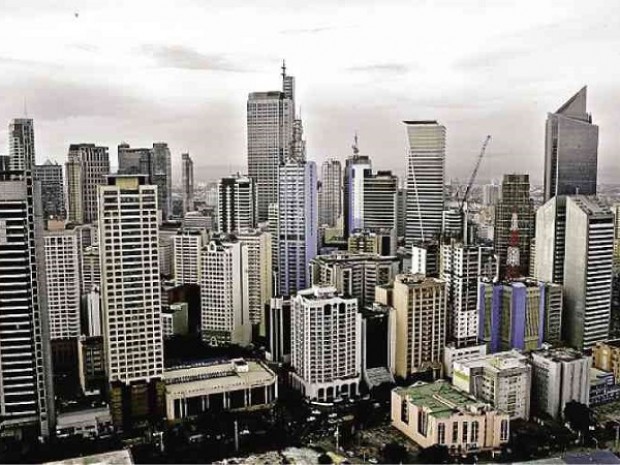
INQUIRER FILE PHOTO
MANILA, Philippines — Thanks to the vibrant business process outsourcing (BPO) industry, local office demand is seen revisiting levels last seen in 2016, the year before the influx of Philippine offshore gaming operators (Pogos), property veteran David Leechiu said.
Office demand before the heyday of Pogo operations stood at about 647,000 square meters (sqms) annually, based on 2016 data, which Leechiu said the Philippines had a “good chance” of hitting again “if not this year, [by] next year.”
After former President Rodrigo Duterte rekindled bilateral ties with China in 2016, Pogos came to the country in droves, taking up vacant offices across the metropolis.
Exodus
But due to the confluence of COVID-19 pandemic lockdowns and shutdown of borders, local tax regime uncertainties and the crackdown against gambling in China, there was an exodus seen in the last few years.
It was only this year that Pogos started to come back, taking up long-vacated offices and repopulating urban residences, although not in the same aggressive pace seen in the early days of the Duterte regime.
Encouraging numbers
Nonetheless, Leechiu, founder and CEO of Leechiu Property Consultants, expects the growth momentum of the office property sector to speed up in the second half of 2022, with the implementation of the no-lockdown directive and the end of work-from-home arrangements for Philippine Economic Zone Authority-accredited office occupiers, which enjoyed more flexibility during the lockdowns.
Property leasing transactions in various stages of negotiation have been “very encouraging” and so far been the highest since the start of the pandemic at 451,000 sqms in the second quarter of 2022, mostly accounted for by the resilient information technology-business process management (IT-BPM) sector (with live demand of 212,000 sqms), Leechiu said.
In the second quarter of last year, total requirements for office space in the country stood at just 330,000 sqms.
With the Philippines poised to return to prepandemic as well as pre-Pogo office vibrancy, Leechiu said this cemented the country’s position as one of the major office markets in the world.
As of the second quarter of 2022, Leechiu noted that actual office absorption in the country stood at 255,000 sqms., the highest seen since the start of the pandemic.
The IT-BPM sector today is a major employer in the country accounting for 1.4 million jobs . The IT & Business Process Association of the Philippines (IBPAP) reported that the industry had employed 120,000 new workers in 2021 alone – the second highest annual number of jobs created since the inception of the local BPO industry.
The Philippine office segment, the residential sector and tourism are well positioned to enjoy strong growth arising from the opportunities brought about by a “multitude of global headwinds,” including global inflation and rising interest rates, Leechiu said.
For the residential condominium sector, he said the easing of mobility protocols would likely result in higher activity levels.
“The take-up in second quarter 2022 was at 9,030 units or already 70 percent of pre-COVID levels, thanks to stretched down payments for amortization and other concessions offered by developers,” Leechiu said.
Moreover, he noted that higher construction costs and the market uncertainties would prompt developers to offer even better payment terms to buyers in an effort to reduce inventory levels and to pave the way for new launches.
“Investors and buyers would be wise to grab this opportunity to lock down the price today and to pay interest-free downpayment over a period of up to four to five years. They will be highly rewarded in the recovery a few years from now,” he said.
Investment strategies to keep up with rising inflation rates are seen to be the key to mitigating diminishing buying power.
“Real estate has always been considered one of the safest assets for capital preservation in times of economic uncertainty. Amid the string of crises experienced over the past decades, investments in residential lots in the high-end gated subdivisions in Metro Manila have proven to be excellent stores of value,” Leechiu said.
He welcomed Pres. Marcos’ pronouncement during the State-of-the-Nation Address to spend 5 percent of the country’s gross domestic product (GDP) on improving roads and transportation systems in key cities, a continuation of the previous administration’s “Build, Build, Build” initiative.
With infrastructure projects increasing accessibility from Metro Manila to Southern Mega Manila, he noted how land values have consequently risen in neighboring communities, with residential lots in Cavite and Laguna increasing by 7 to 15 percent annually. Continuation of these infrastructure projects is seen to encourage residential developers to launch more projects.
RELATED STORIES
JLL Philippines names BPOs, ecommerce, logistics as space demand drivers
IBPAP: BPOs still need tax perks
Gov’t says BPOs still keen to invest in PH even without tax perks

